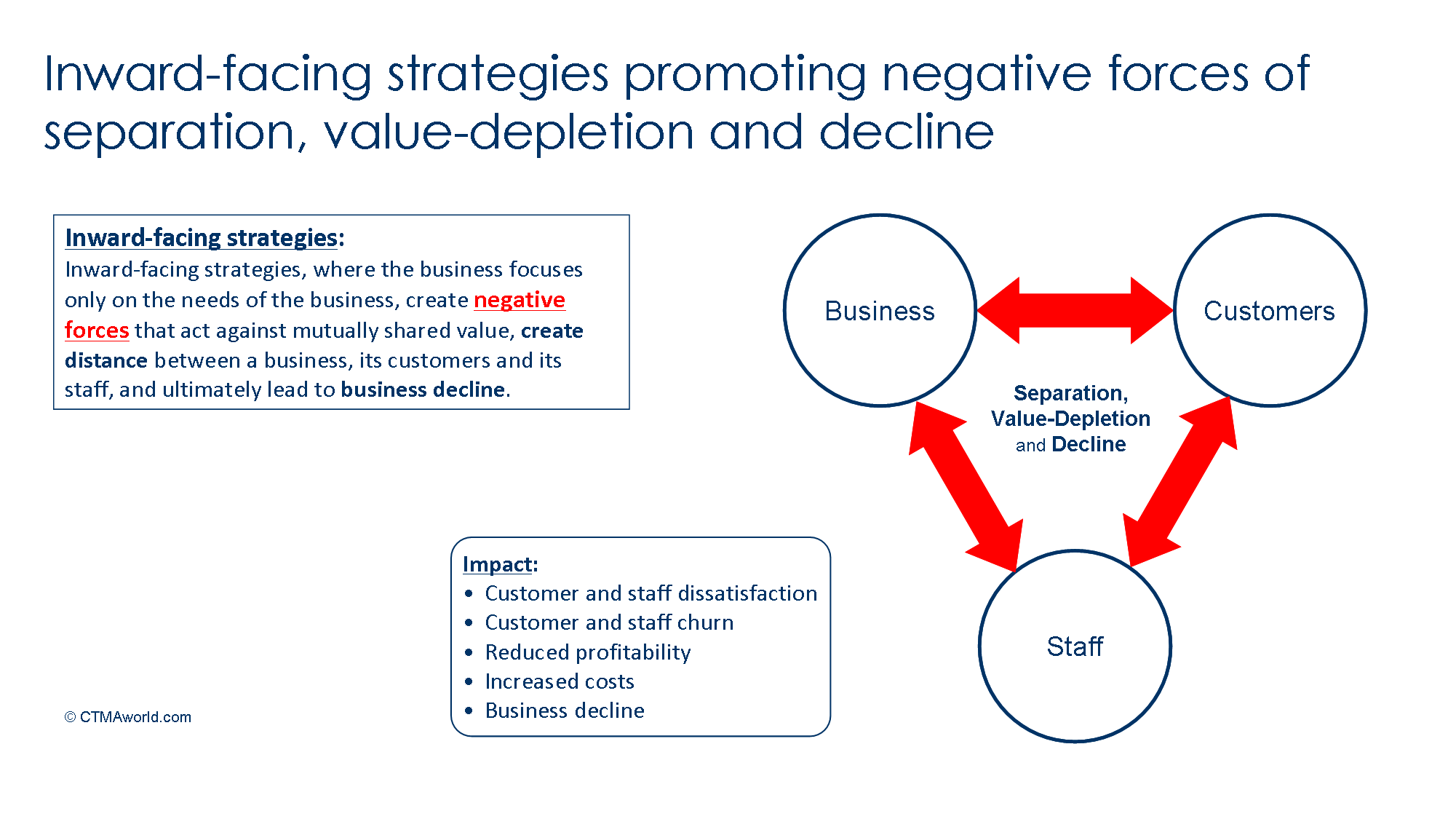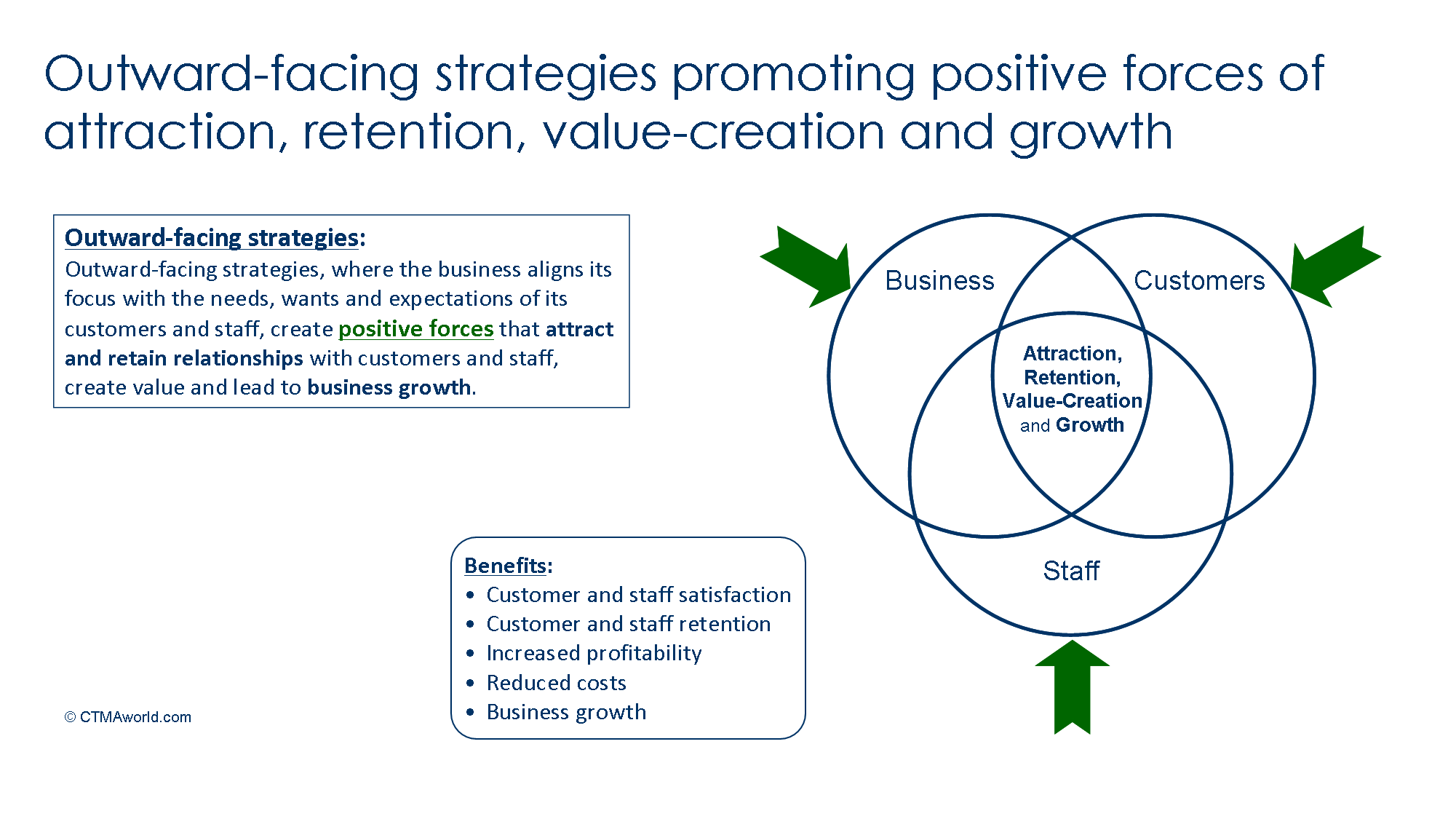At the core of a typical business ecosystem is a constantly evolving dynamic between the needs of the business, the needs of its customers and the needs of its staff. Each, having its own set of individual goals, priorities and criteria for success, there is a natural, but conflicting and self-limiting tendency to focus inwardly.
Strategies of compromise, dissatisfaction and decline
At best, by constantly juggling one set of needs against the needs of another, the outcome inevitably becomes a compromise for all. Naturally, businesses will always want to make more profit, customers will always want to pay less, and employees will always want to be paid more. But, pursuing these goals independently, each risks adopting behavioural traits that descend a downward spiral into dissatisfaction and business decline:
- Businesses might attempt to increase profits by: increasing prices, reducing what they pay suppliers, and cutting staff and business costs.
- Consumers might make choices on price alone, or simply do without.
- Staff might become disgruntled and unengaged.
For each of these groups, these inward-facing strategies typically involve very little awareness, compassion or concern for the needs, wants and expectations of the other. They create negative forces that act against the creation of mutually shared value and create distance between a business, its customers and its staff, and ultimately lead to under-performance and possible business failure.

Strategies supporting mutually assured success
The post-2020 recalibration of customer and staff relationships is forcing businesses to build a more sustainable environment – where the business, customers, and staff can all benefit from mutually supporting interests, rather than be driven to mutual assured destruction.
This new paradigm is characterised by outward-facing strategies, where businesses provide valued products and services, delivered by engaged staff, empowered to meet and exceed the needs, wants and expectations of customers.
For businesses, staff and customers, these outward-facing strategies typically involve a strong awareness of the needs, wants and expectations of each other. This creates positive forces that build mutually shared value that attracts businesses, staff and customers towards each other.
When businesses focus on the needs, wants and expectations of their customers and staff, it leads to customers returning to do more business, businesses becoming more commercially successful, and thus being able to provide staff with better rewards and working conditions.

To achieve this sustainable state of alignment and common purpose, businesses, staff and customers must each accept a number of key behavioural responsibilities that act together to lead to their mutual success. For example:
- Businesses must make it easy for customers to do business with them, listen and learn from their customers, and continuously improve the way they do business
- Customers must clearly communicate their needs and provide helpful feedback to businesses
- Staff must understand the value their company’s products and services provide their customers, and engage positively with customers to help them best satisfy their needs
Now, more than ever, organisations must stop juggling one set of needs against the needs of another, and start creating value for their own organisations, their customers and their staff. They must build a customer-driven enterprise that can remove barriers to business, seek out and fix the problems that customers and staff experience, excel at service delivery, and outperform their competition. Aligning the needs of the business, the needs of its customers, and the needs of its staff has become a new urgency for business success in a post-2020 world.
© CTMA New Zealand Ltd.
Let’s talk
If you’re preparing your organisation for recovery now, if you are embarking on (or even partly through)
a customer experience improvement programme, please
get in touch so we can
schedule an introductory call (or Zoom Meeting) to discuss your specific
challenges and ways we can help
you in your mission to get customer experience right.![]()
About the author: Paul Linnell
 Paul Linnell is a customer experience and service quality
improvement champion, working internationally with senior managers
and their teams to help them achieve business success, reduce risk
and build customer loyalty and advocacy by taking actions to improve
customer experiences. Paul specialises in the design and deployment
of customer experience measurement, service quality improvement,
complaints handling and preventive analysis programmes. Industries
he has worked with include, Automotive, Consumer electronics,
Consumer goods, Electricity & Gas retail, Financial services,
Information technology, Local Government and Public Sector, Media /
Publishing, Passenger travel (Rail, Air and Sea), Pharmaceuticals
and Telecommunication. Paul has worked with clients and presented on
these subject at conferences and corporate events in the UK, Europe,
North America, the Middle East, Australia and New Zealand.
Originally from the UK and now based in New Zealand, he continues to
serve clients globally.
Paul Linnell is a customer experience and service quality
improvement champion, working internationally with senior managers
and their teams to help them achieve business success, reduce risk
and build customer loyalty and advocacy by taking actions to improve
customer experiences. Paul specialises in the design and deployment
of customer experience measurement, service quality improvement,
complaints handling and preventive analysis programmes. Industries
he has worked with include, Automotive, Consumer electronics,
Consumer goods, Electricity & Gas retail, Financial services,
Information technology, Local Government and Public Sector, Media /
Publishing, Passenger travel (Rail, Air and Sea), Pharmaceuticals
and Telecommunication. Paul has worked with clients and presented on
these subject at conferences and corporate events in the UK, Europe,
North America, the Middle East, Australia and New Zealand.
Originally from the UK and now based in New Zealand, he continues to
serve clients globally.

.png)